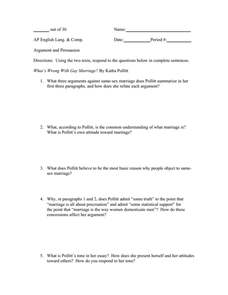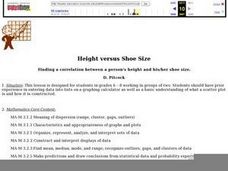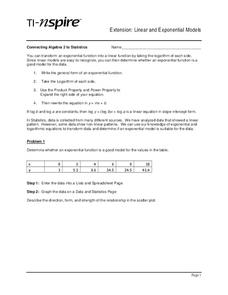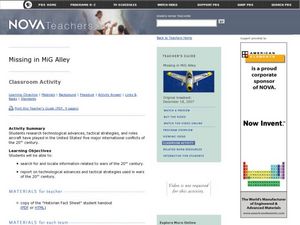Curated OER
Argument and Persuasion: What's Wrong With Gay Marriage?
The topic of gay marriage has gotten lots of attention recently. Without actually asking your class their personal opinions, this two-page worksheet has pupils study two essays about gay marriage. Readers analyze the attitude, tone, and...
US National Library of Medicine
Mental Health Awareness Project
Here is a thoughtful group assignment for researching mental health disorders. Team members focus on a different aspect of a chosen disorder: symptoms, treatments, and community resources.
Curated OER
What's Your Average? What Do You Mean? I'm More Than Just Average
Upper grade and middle schoolers collect data, analyze and interpret the data. This three-part activity should provide learners with a firm understanding about the differences between mean, median, and mode and how to perform the...
Curated OER
The Synagogue on Praska Street
Students discover the significange of a synagogue that was destroyed during World War II. As a class, they identify and describe Jewish symbols and are introduced to Croatian Jewry. They review the characteristics of a minority and read...
Curated OER
Two-Variable Linear Inequalities
Here is an engaging lesson on solving equations with two variables. Have the class rewrite linear equations in the slope intercept form, y=mx + b. They graph the lines using the slope and y-intercepts.
Curated OER
The Talking Goat
Students read and analyze an African folktale. They read and discuss the folktale, analyze a map of Africa and Liberia, complete a worksheet, answer discussion questions, and analyze the patterns and analogies of the folktale.
Curated OER
Pizza Possibilities
Pupils create and interpret line plots, bar graphs, and circle graphs. The lesson assumes mastery of conversions from fraction to decimal to percent, construction of angles, and at least an introduction to graphs displaying data.
Curated OER
One Size Fits All, Part 1
Can you tell how tall someone is just by looking at their feet? In this activity, young mathematicians measure their height, arm span, and foot size, graph their findings, and answer questions about how these measurements are related....
Curated OER
Height versus Shoe Size
Middle schoolers find a correlation between a person's height and his/her shoe size. They have access to entering data into lists on a graphing calculator and can complete scatter plots. Students read and interpret a scatter plot and use...
Curated OER
Drug Sales Soar: Bar Graph
In this graphs worksheet, students analyze a bar graph that shows retail prescription drug sales in the U.S. Students complete five problem solving questions about the data on the graph.
Curated OER
Drug Sales Soar - Rate of Change
In this prescription drug worksheet, students answer short answer questions and create graphs on the sales of prescription drugs over a five year span. Students complete six questions.
Curated OER
Ashes to Ashes: Using Evaporation Rate to Identify an Unknown Liquid
Learners explore the concept of evaporation rates in this evaporation rates lesson. They will try to identify the chemical that began a fire, perform an experiment where they use the evaporation rates to determine the unknown liquid, and...
Curated OER
Linear and Exponential Models
Learners linearize data to determine if an exponential model is suitable. For this linearizing data to determine if an exponential model is suitable lesson, students graph the residuals of sets of data that appear to have an exponential...
Curated OER
Linear and Exponential Models
Students investigate the differences between linear and exponential models. In this linear and exponential models lesson, students make a table of given data. Students determine if the data is linear or exponential by plotting the data...
Curated OER
Understanding Demographics
Students use demographic information to gain an understanding of the Dominican Republic. They compare demographic data from the United States and the Dominican Republic and describe the difference between learning about a country from...
Curated OER
A Twisted Love Poem
High schoolers read poem about dating violence, discuss meaning of the poem, and compose essay about their interpretation and reactions to it.
Curated OER
Hunt for the Serial Arsonist
Students prepare study, and graph fingerprint patterns. They create latent fingerprints and look for common features in their prints for classification.In addition, they create a graph showing the distribution of different patterns...
Curated OER
Missing in MiG Alley
Students consider how technology impacted American conflicts. For this technological advances lesson, students read, "The Changing Face of War," and then describe how technology made differences in World War I, World War II, the Korean...
PBS
Women's History: Clara Barton
Students investigate Clara Barton's contributions to society. In this Clara Barton lesson plan, students watch videos, listen to lectures, and conduct research regarding Clara Barton's life and her possible authorship of a Civil War...
Curated OER
Earthquakes and Plate Tectonics
High schoolers research about earthquakes that took place within a certain distance from their place. In this geology instructional activity, students explain why earthquakes occur. They analyze patterns of different earthquakes using a...
Curated OER
Corn-Crop is a Bin-Buster
Learners calculate percent change and create lists of data. They enter the corresponding bushels of corn measured in billions to their list and display, then convert the acres into scientific notation and use the value on the home screen...
Curated OER
Acting Like a Hog
Students explore game theory. In this secondary mathematics lesson, students plat the game of HOG using dice and explore the optimal strategies. Students play the game three ways: any number of dice, a fixed number of dice and using...
Curated OER
What Happened to Robin?
Students investigate animal injuries caused by humans. They present their findings to various neighborhood groups.
Curated OER
How Long? How Wide?
Second graders distinguish between and use nonstandard and standard units of measurement, use appropriate tools and techniques to measure length and width, and record and interpret data using graphs.

























